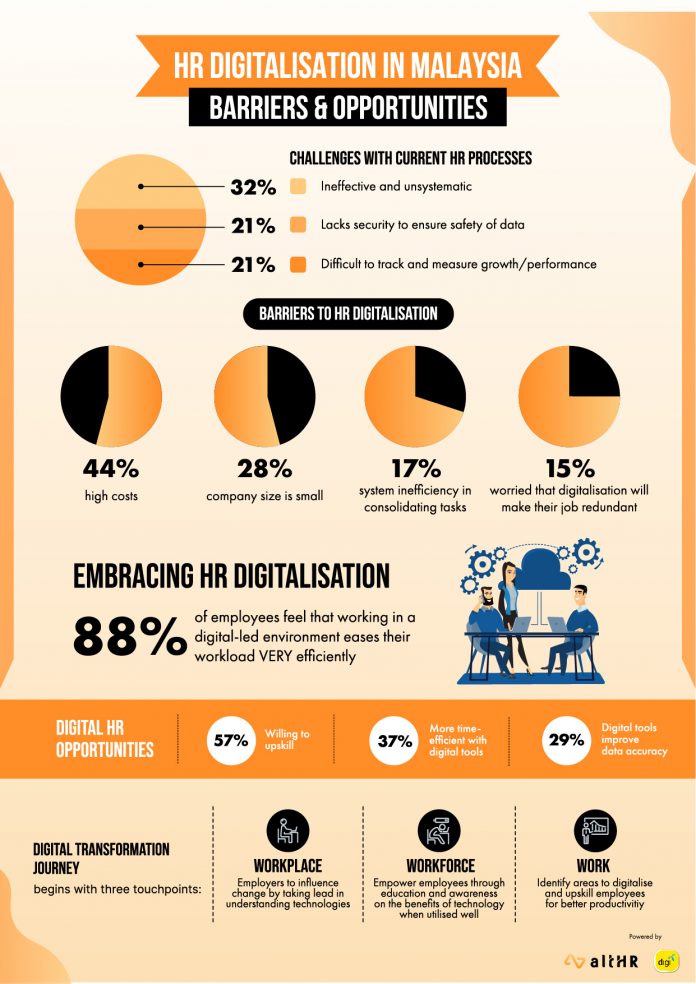The Future of Work: 1 out of 3 HR employees say that traditional HR processes are ineffective and unsystematic
Human Resource (HR) operations have come a long way from the days of paperwork, filing documents and overflowing cabinets. While it is common these days for small businesses to rely on computer programmes such as Microsoft Excel to capture and organise HR-related data, it is far from what technology can do to digitalise HR operations, and in turn, increase productivity for businesses.
With this in mind, Digi recently commissioned a survey titled ‘Human Resource Digitalisation in Malaysia’ with Vase.AI to find out the opinions HR employees across industries in Malaysia had in regards to digitalisation in HR. Results showed that 32% of employees find their current traditional HR processes ineffective and unsystematic as it is labour intensive. 21% say it is lacking security to ensure safety of data and a further 21% lament that it is difficult to track and measure growth or performance through these traditional tools. What may have been effective then may no longer be as effective now.
In these times where digital savviness is almost a necessity, many would think that digitalisation would be the easiest option. However, it is not always so simple. Digitalisation may pose challenges in various areas of a company, such as lack of education and experience as well as an unwillingness to change legacy systems.
The survey reveals that 36% of employees who do not currently have any experience using a HR digitalised platform do not know if their company has plans to do so; while 28% say their companies do plan to move in that direction but did not have concrete plans as to when it will be rolled out.
Companies who did adopt digitalised HR platforms and instead reverted to traditional processes cited high costs as a reason (44%), with 28% of companies not seeing the need due to their small size and 17% expressing that system inefficiency in consolidating all tasks was an issue. A small percentage (15%) were worried that digitalisation would make their job redundant.
Cultivating future-ready employees
Although the occurrence of the pandemic has been the reason for many companies to turn to digital tools, it has been effective in driving the growth and expansion of many others around the country long before the movement control order (MCO). There were talks at length on the emerging Industry 4.0 (IR4.0) and the adoption of digitalisation was encouraged through many government initiatives and grants to shift the country towards a digital economy.
The pandemic, and its subsequent lockdown periods has taught us many lessons in preparedness and efficiency. How does one continue when ‘business as usual’ cannot go on due to a disruption in daily processes? How can employees remain efficient and productive in the face of a crisis? Will the way of work remain the same and how can we prepare for the future? The answer mainly lies in the role that digitalisation plays in ensuring productivity and business continuity to be future-ready.
In the survey, a whopping 88% of employees feel that working in a digital-led environment eases their workload very efficiently; whereas survey respondents who were not working in such an environment did see the value in digitalisation. More than half (57%) said that they were willing to upskill themselves to keep up with the changes, with 37% viewing it as a means to be more time-efficient and 29% believing that such tools will improve the accuracy of the data.
With most of the world latching onto this digital shift, companies who do not digitalise run the risk of losing relevance in an increasingly internet-heavy sphere. They may lose out on business competitiveness as other companies turn to social media platforms to interact with customers, and also see an increase in costs as they have to rely on age-old systems that may not be as streamlined as one single digital platform.
Starting from within
In order to begin on their digital transformation journeys, companies need to look into their digital DNA; and if they do have one, they need to evaluate its effectiveness through three main touchpoints: Workplace, Workforce and Work.
1. Workplace – The Role of the Employer
Change needs to be applied throughout the company, beginning with the top. Employers themselves need to break from legacy systems and change their mindsets on what works and what no longer does. They should influence and affect change by taking the initiative to understand new technologies and apply them within the company.
2. Workforce – Empowering the Employees
Providing education and awareness on digital tools is important to ensure that those doing the day to day work are comfortable with the technology being used. Although learning new technologies and way of work may be challenging at first, its benefits far outweigh the effort put into learning how to utilise them well.
3. Work – Relooking everyday operations
It is important to first determine what needs to be digitalised and which processes can benefit from a digital touch. Employees do not need to worry about losing their jobs to these digital tools as using them will only free them from manual, labour-intensive work which enables them to work on higher-level tasks. In essence, these employees have the chance to upskill and increase their aptitude to contribute to the organisation, leading to greater productivity and profitability.
Looking ahead
Digi’s Chief Digital Officer, Praveen Rajan explains that digitalising HR is an important step in creating a better employee experience that will lead to better output, and a great starting point for companies to embark on its digital transformation. “The future of work will mean that there is a constant need to examine emerging skills, employee experience and key work trends. Employee expectations will continue to evolve, and HR has to move with the times to meet them. Digitalising HR will help to streamline many processes that would normally take up much of an employee’s time and provide them with ease of work – in Digi we have seen the results of digitalisation in many areas and have created our own HR super app, altHR in our quest for a ‘perfect’ HR solution. Using altHR has transformed the way we manage our HR processes and engage with all our employees.”
As the survey findings show, HR employees are willing to digitalise and view digital HR as a way forward, but many are held back by what they perceived as barriers to entry, which in reality are easily overcome once they are equipped with the right knowledge and tools. altHR was built to address these gaps and challenges.
Utilised within Digi for the past few years, altHR was recently rolled out publicly to help more Malaysian companies, especially small and micro businesses, go digital and cope better with previously unforeseen challenges brought upon by the pandemic. As a digital workforce management solution, altHR is built with features such as digital sales kits, contactless time tracking, paperless leave and expense management – allowing employers to track workflow efficiently and freeing up employees from labour intensive tasks to increase productivity at work.
Companies can also use altHR to digitally onboard new hires, manage internal HR enquiries and engage with employees. altHR functions via an app and desktop web application, doing away with the hassle of complicated installations. It is also available at an affordable starting price, so businesses do not need to break the bank when choosing to go with altHR.
While many businesses have adapted to the current climate by pivoting and finding alternative sources of revenue, the change does not stop there. Companies have to continue seeking out ways to improve, evolve and charge ahead in moulding the way of work for a digital future. Fundamentally, businesses do not go from being barely digital to being fully digitalised overnight, but every journey has to begin with the first step.





















